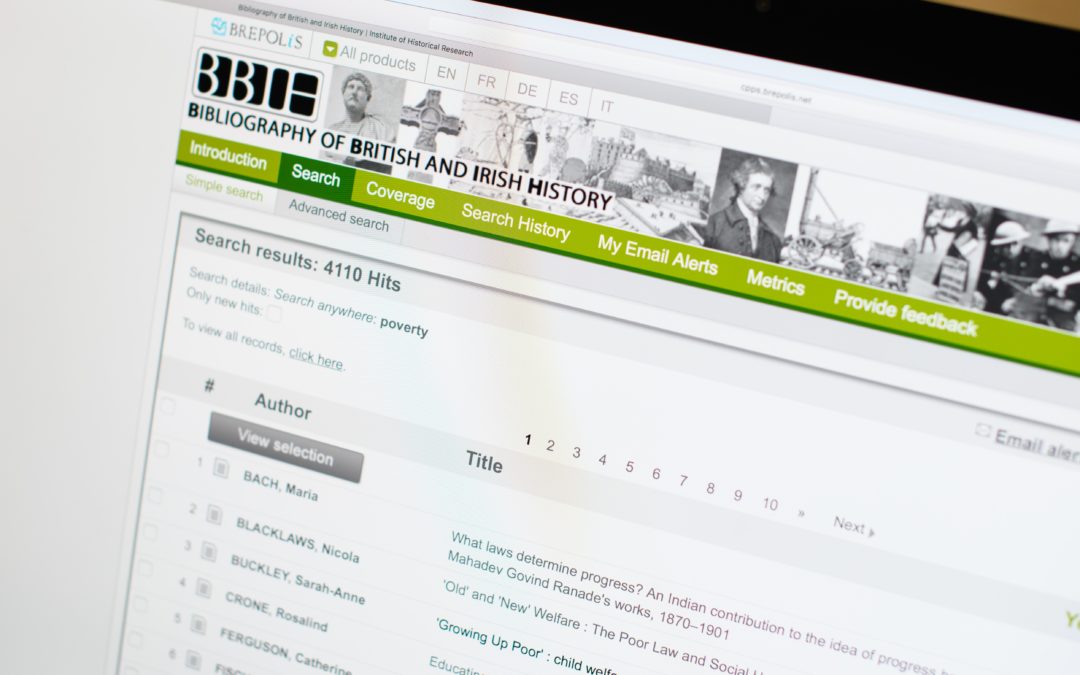The latest update to the Bibliography of British and Irish History was published on 23 March 2018. There are 3,738 new records. Of these some 633 new records relate to Irish history while 149 deal with the history of London, 276 with the history of Scotland and 90 with the history of Wales. The overall total of records available online is now 597,689.
To help students use the Bibliography we have created a “Guide for Students” page. It includes basic material on what a bibliography is, and why you should use one, as well as a case study. We plan to add additional material in the future.

So the basic question – why use a bibliography?
You’ve been given an essay on the impact of World War I on the home front; the changing nature of motherhood; the development of royal government under Henry III; or the representation of Jews in medieval England.
Where to start? You’ll probably already been given a reading list by your tutor. This is a basic bibliography – a listing of relevant books and journal articles covering a particular subject usually listed by author name. You may very well access this listing through your local VLE or Moodle account in which case links to local library holdings, and often online text, will be included.
So there’s no reason to go “off piste” and use another bibliography is there? Well no, not really. But if you are interested in the subject and feel additional research is needed, fine. And if you want your essay to stand out from the crowd, and for your tutor to know that you’ve gone the extra mile, it really helps (and your tutor will probably appreciate reading something more original).
It’s also a good habit to explore other options so that when you come to write your dissertation or long essay you are more aware of the resources available. Also increasingly, courses are assessing students on such additional resources whether they be primary sources, bibliographies or online material. And certainly if you are preparing for any post-graduate course knowledge of additional resources is paramount.
But of course everything is supposedly on Google or Google Books/Scholar or even available in huge databases such as EBSCO or JSTOR. So you don’t need a bibliography or to search a bibliography. Right again. But try searching for the above subjects on Google; what search terms to use; how to narrow searches; or access only academic material?
Google also remembers your previous searches, your language settings, your location, what you clicked on last – all of which will skew your search results. And let’s face it who checks pages 3 onwards for Google results?
Again try searching EBSCO or JSTOR – full of incredibly useful academic material, but again what terms to use – The Great War, First World War, World War One, World War One? How can you filter these terms? Can you focus on one particular aspect of World War I, such as the impact of war on the people in northern England? Or how many resources were published in each decade afterward? Or, can you compile an historiographical outline on a given topic?
Using Henry III of England as an example: according to Wikipedia there are 16 entries for a “Henry III” from the Duke of Bavaria to the King of Navarre. Below lists the search results for a variety of resources looking for Henry III (of England).
| Search/Resource |
Henry III |
“Henry III” |
“Henry III” England |
Specialist search |
| 60,900,000 | 744,000 | 453,000 | 74,000 “Henry III” England inurl:.ac.uk | |
| Google Books | 474,000 | 277,000 | 173,000 | – |
| JSTOR | 151,464 | 4,626 | 3,552 | 2,933 ((“Henry III”) AND disc:(history-discipline) |
| Copac | 52,915 | 6007 | 2755 | 569 (Henry III, King of England 1207-1272) |
| Historical Abstracts (EBSCO) | 262 | 221 | 28 | 26 (PE ” HENRY III, King of England, 1207-1272″) |
| International Medieval Bibliography | 552 | 255 (default to Henry III, King of England) | – | – |
| BBIH | 820 | 317 (default to Henry III, king, 1207-1272) | – | – |
All searches conducted during October 2016.
From the above table it seems obvious that a search on JSTOR, Copac, Historical Abstracts, IMB and BBIH provide the student with easy access to quality academic material on a relatively manageable scale.
I’m not saying don’t use Google or other search engines; and I’m not saying an online bibliography is the one-stop shop for all your research needs, but it should certainly be the first stop. From that initial manageable listing it’s then easier to undertake your research using Google Books or better still Google Scholar.
For help in searching Google – try using some of the search options.

